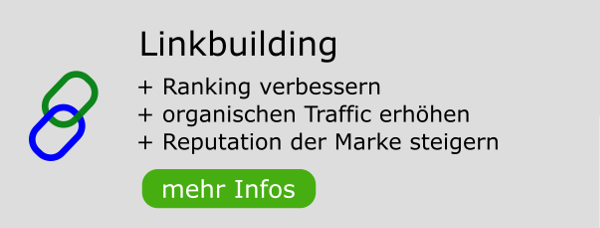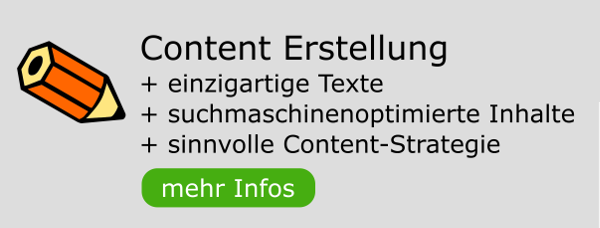Du befindest Dich im Archiv vom ABAKUS Online Marketing Forum. Hier kannst Du Dich für das Forum mit den aktuellen Beiträgen registrieren.
Minus 950er Strafe bei Google
-
Italia Sun Tours
- PostRank 6

- Beiträge: 346
- Registriert: 16.11.2006, 14:53
- Wohnort: Italien
February 08, 2007
The 950 Penalty or a New Ranking Theory?
I should preface this by saying everything you read below is pure speculation, but the fact that it’s pure speculation is why this post is so fun and you should read every single word without getting up for more water, checking your email, refreshing your MyBlogLog profile or using the restroom.
If you haven’t noticed the much-hyped debate regarding the maybe real/maybe not real Google Minus-950 penalty is heating up and is actually getting interesting.
We first started hearing talk about a supposed Minus-950 penalty back in January when several webmasters complained that pages that traditionally ranked very well were now being hidden on the last page of the search engine results. Even odder was that the only sites that seemed to be experiencing this problem were spam sites or high quality niche sites. Sites that fell in the middle were left unaffected. (Or have just been taught that openly complaining is annoying and is not a good way to make friends.)
At the time, the discussion in the forum focused on whether this penalty actually existed and why it was only certain pages that were being affected, not the entire site. Three explanations presented were:
1. The penalty was a result of over-optimization, most often using too similar anchor text on a page.
2. A sign that Google can’t differentiate between scraper sites and the original content producers. For example, Google runs across an instance of duplicate content in their index, doesn’t know which site to punish, so both sites are banished to the last page of the SERP.
3. It's somehow related to Google’s disengaging of the George W. Bush Googlebomb since both acts moved once high ranking pages out of a searcher's view.
As you can see, the “explanations” offered read more like “outright guesses”, and no possibility seem too outrageous. Like most forum debates, the conversation went largely unresolved.
The thread was rekindled today after WebmasterWorld administrator Tedster read through a patent filed (on my birthday) last June by Googler Anna Lynn Patterson. The patent is named “detecting spam documents in a phrase based information retrieval system” and discusses a system where word phrase frequency is used to determine if a page is spam. Some have called it low-scale version of latent semantic indexing.
The patent’s abstract reads:
“Phrases are identified that predict the presence of other phrases in documents. Documents are the indexed according to their included phrases. A spam document is identified based on the number of related phrases included in a document.”
The idea here (I think) is that too many like or related phrases signals that a page is keyword stuffing and not providing useful information to the reader. Based on that find, Tedster broke off the original thread and asked: Is it a “950 Penalty”? Or is it Phrase Based-Re-ranking. Basically, is the 950 Penalty real or is Google re-ranking results due to phrase-based factors.
Tedster believes the latter, that this patent is responsible for the “penalty” site owners have been experiencing:
“My gut is telling me that this isn't really a penalty, it's an interactive effect of the way the Google dials have been turned in their existing algo components. It's like getting a poor health symptom in one area of your body from not having enough of some important nutrient -- even though you've got plenty of others and plenty of good health in many ways.”
It’s hard to tell what’s going on or if anything is going on at all. Tedster backs up his assertion by reporting that he knows of a site where “one solid new inbound link from a very different domain” solved the site owner’s problem. But another member says it took him “de-optimizing” his site and lowering the keyword density of things like page titles, and body content before his site regained its rankings. So we’ve come full circle.
What do you think? Is there really a penalty or is there a filter that re-ranks results based on a sort of latent semantic indexing? If there is a penalty, is it just the MSSA penalty in disguise or is it legitimate?, Is one thing responsible for everything or is it just easier for people to make up new Google penalties than to accept responsibility for a crappy site?
The conversation is still going on at WMW so go check it out.
QUELLE: https://www.bruceclay.com/blog/archives ... nalty.html
The 950 Penalty or a New Ranking Theory?
I should preface this by saying everything you read below is pure speculation, but the fact that it’s pure speculation is why this post is so fun and you should read every single word without getting up for more water, checking your email, refreshing your MyBlogLog profile or using the restroom.
If you haven’t noticed the much-hyped debate regarding the maybe real/maybe not real Google Minus-950 penalty is heating up and is actually getting interesting.
We first started hearing talk about a supposed Minus-950 penalty back in January when several webmasters complained that pages that traditionally ranked very well were now being hidden on the last page of the search engine results. Even odder was that the only sites that seemed to be experiencing this problem were spam sites or high quality niche sites. Sites that fell in the middle were left unaffected. (Or have just been taught that openly complaining is annoying and is not a good way to make friends.)
At the time, the discussion in the forum focused on whether this penalty actually existed and why it was only certain pages that were being affected, not the entire site. Three explanations presented were:
1. The penalty was a result of over-optimization, most often using too similar anchor text on a page.
2. A sign that Google can’t differentiate between scraper sites and the original content producers. For example, Google runs across an instance of duplicate content in their index, doesn’t know which site to punish, so both sites are banished to the last page of the SERP.
3. It's somehow related to Google’s disengaging of the George W. Bush Googlebomb since both acts moved once high ranking pages out of a searcher's view.
As you can see, the “explanations” offered read more like “outright guesses”, and no possibility seem too outrageous. Like most forum debates, the conversation went largely unresolved.
The thread was rekindled today after WebmasterWorld administrator Tedster read through a patent filed (on my birthday) last June by Googler Anna Lynn Patterson. The patent is named “detecting spam documents in a phrase based information retrieval system” and discusses a system where word phrase frequency is used to determine if a page is spam. Some have called it low-scale version of latent semantic indexing.
The patent’s abstract reads:
“Phrases are identified that predict the presence of other phrases in documents. Documents are the indexed according to their included phrases. A spam document is identified based on the number of related phrases included in a document.”
The idea here (I think) is that too many like or related phrases signals that a page is keyword stuffing and not providing useful information to the reader. Based on that find, Tedster broke off the original thread and asked: Is it a “950 Penalty”? Or is it Phrase Based-Re-ranking. Basically, is the 950 Penalty real or is Google re-ranking results due to phrase-based factors.
Tedster believes the latter, that this patent is responsible for the “penalty” site owners have been experiencing:
“My gut is telling me that this isn't really a penalty, it's an interactive effect of the way the Google dials have been turned in their existing algo components. It's like getting a poor health symptom in one area of your body from not having enough of some important nutrient -- even though you've got plenty of others and plenty of good health in many ways.”
It’s hard to tell what’s going on or if anything is going on at all. Tedster backs up his assertion by reporting that he knows of a site where “one solid new inbound link from a very different domain” solved the site owner’s problem. But another member says it took him “de-optimizing” his site and lowering the keyword density of things like page titles, and body content before his site regained its rankings. So we’ve come full circle.
What do you think? Is there really a penalty or is there a filter that re-ranks results based on a sort of latent semantic indexing? If there is a penalty, is it just the MSSA penalty in disguise or is it legitimate?, Is one thing responsible for everything or is it just easier for people to make up new Google penalties than to accept responsibility for a crappy site?
The conversation is still going on at WMW so go check it out.
QUELLE: https://www.bruceclay.com/blog/archives ... nalty.html
-
touri
- PostRank 4

- Beiträge: 148
- Registriert: 31.12.2003, 17:41
- Wohnort: Bonn
Hi Reddog,
War mit meiner Seite ziemlich lange bei meinem Hauptkey auf der ersten Seite und mit vielen anderen auch sehr gut gelistet. Ich hatte ein paar Tage vor dem ersten Absturz am 20.01. die Verlinkung von 4 Bildern ändern müssen, da der Buchungsmaschinenlieferant da was umgestellt hatte - und bei der "Gelegenheit" habe ich in die alt-Texte gleich noch die Wörter "Hauptkeywortphrase" mit aufgenommen, also gab es auf der Startseite das Wort zusätzlich 4x und dadurch kam ich wohl auf eine zu hohe Keyworddichte.
Habe am 21.01. dann sofort zurückgeändert und als ich dann im Webmasterworld Forum las, es könnte Überoptimierung sein, habe ich auch gleich noch angefangen meine Menüs zu ändern. Da stand immer die komplette url (also auch das Hauptkeywort) drin. War dann am 27.01. wieder da und zwar besser als vorher. Aber nur bis zum 30.01., da war ich dann abends wieder komplett weg. Habe dann die Änderungen bzgl. Menüs auf allen Unterseiten fortgesetzt, mir am 06.02. einen richtig guten Link geleistet und auf vielen Unterseiten (ca. 300.000) 3 reziproke Links zu anderen Seiten von mir entfernt.
Gestern und Heute habe ich mir nochmals das Spam Detection Patent durchgelesen und da blieb mein Blick an den "honeyspots" hängen. Ein ebenfalls ganz hinten stehender Konkurrent hat genau wie wir im Titel der Startseite das Wort "billig" drin und auf dem gro der Unterseiten taucht dieses Wort nicht auf. Habe ich Heute Vormittag geändert.
Vielleicht hilft das jemand.
Gruss Touri
War mit meiner Seite ziemlich lange bei meinem Hauptkey auf der ersten Seite und mit vielen anderen auch sehr gut gelistet. Ich hatte ein paar Tage vor dem ersten Absturz am 20.01. die Verlinkung von 4 Bildern ändern müssen, da der Buchungsmaschinenlieferant da was umgestellt hatte - und bei der "Gelegenheit" habe ich in die alt-Texte gleich noch die Wörter "Hauptkeywortphrase" mit aufgenommen, also gab es auf der Startseite das Wort zusätzlich 4x und dadurch kam ich wohl auf eine zu hohe Keyworddichte.
Habe am 21.01. dann sofort zurückgeändert und als ich dann im Webmasterworld Forum las, es könnte Überoptimierung sein, habe ich auch gleich noch angefangen meine Menüs zu ändern. Da stand immer die komplette url (also auch das Hauptkeywort) drin. War dann am 27.01. wieder da und zwar besser als vorher. Aber nur bis zum 30.01., da war ich dann abends wieder komplett weg. Habe dann die Änderungen bzgl. Menüs auf allen Unterseiten fortgesetzt, mir am 06.02. einen richtig guten Link geleistet und auf vielen Unterseiten (ca. 300.000) 3 reziproke Links zu anderen Seiten von mir entfernt.
Gestern und Heute habe ich mir nochmals das Spam Detection Patent durchgelesen und da blieb mein Blick an den "honeyspots" hängen. Ein ebenfalls ganz hinten stehender Konkurrent hat genau wie wir im Titel der Startseite das Wort "billig" drin und auf dem gro der Unterseiten taucht dieses Wort nicht auf. Habe ich Heute Vormittag geändert.
Vielleicht hilft das jemand.
Gruss Touri
-
weltweit
- PostRank 4

- Beiträge: 158
- Registriert: 21.06.2003, 20:31
Eine meiner Seiten springt zwischen dem 50. Platz zu einem hart umkämpften Keyword und dem Nirwana (also ist gar nicht mehr in den Serps), das wechselt alle paar Wochen bis Monate. Das geht schon seit ein paar Jahren so.
Hat jemand dafür eine neue oder alte Theorie?
Hat jemand dafür eine neue oder alte Theorie?
Partnerprogramme und allerlei...
Kooperationsanfragen aller Art immer erwünscht! Zahlreiche Webprojekte unterschiedlichster Themen vorhanden - viele mit regionalem Bezug.
Kooperationsanfragen aller Art immer erwünscht! Zahlreiche Webprojekte unterschiedlichster Themen vorhanden - viele mit regionalem Bezug.
-
Wolfgang Brand
- PostRank 3

- Beiträge: 82
- Registriert: 14.01.2007, 19:08
- Wohnort: Mijas Costa
Im Rahmen der Weiterentwicklung (Evolution) welche nach wie vor bei den meissten Lebewesen feststellbar ist, kann davon ausgegangen werden dass die Schweine der Zukunft fliegen können.
Diese Theorie basiert auf der Erkenntniss das dies der einzige Weg ist dem Schlachter zu entkommen (Überlebenskampf der Spezie) und als logische Konsequenz die Evolution in diese Richtung "steuern" (aka: Sprunghafte Veränderungen der Erbanlagen oder Mutation) muss um den Schweinen eine Zukunft auf unserem Planeten zu sichern.
Quelle: Freie Interpretation nach Charles Darwin
Obige Theory mag leicht befremdend klingen, ist aber immer noch realistischer als eine 950er Strafe bei Google
Diese Theorie basiert auf der Erkenntniss das dies der einzige Weg ist dem Schlachter zu entkommen (Überlebenskampf der Spezie) und als logische Konsequenz die Evolution in diese Richtung "steuern" (aka: Sprunghafte Veränderungen der Erbanlagen oder Mutation) muss um den Schweinen eine Zukunft auf unserem Planeten zu sichern.
Quelle: Freie Interpretation nach Charles Darwin
Obige Theory mag leicht befremdend klingen, ist aber immer noch realistischer als eine 950er Strafe bei Google
-
Italia Sun Tours
- PostRank 6

- Beiträge: 346
- Registriert: 16.11.2006, 14:53
- Wohnort: Italien
Hola Espana!Wolfgang Brand hat geschrieben:ist aber immer noch realistischer als eine 950er Strafe bei Google
Nenn das Kind wie Du moechtest!!! Es gibt ja genuegend Quellen und Betroffene die das verfolgen! Und ob das alles aus der "Luft" gegriffen ist, scheine ich sehr zu bezweifeln! Uebrigens..., Deine Beitrage schaetze ich immer sehr!
Gruss aus Italien
-
GreenHorn
- PostRank 10

- Beiträge: 4487
- Registriert: 19.12.2005, 15:01
Dito... Wärend sich ein Spammer so etwas aus den Finger saugen muß und ggf. bestraft wird, bekommt ein Seo-Märchen-Forum täglich "wertvollen" Gratis-Content und wird zum Alexa-Traffic-König...Wolfgang Brand hat geschrieben:Im Rahmen der Weiterentwicklung (Evolution) welche nach wie vor bei den meissten Lebewesen feststellbar ist, kann davon ausgegangen werden dass die Schweine der Zukunft fliegen können.
Diese Theorie basiert auf der Erkenntniss das dies der einzige Weg ist dem Schlachter zu entkommen (Überlebenskampf der Spezie) und als logische Konsequenz die Evolution in diese Richtung "steuern" (aka: Sprunghafte Veränderungen der Erbanlagen oder Mutation) muss um den Schweinen eine Zukunft auf unserem Planeten zu sichern.
Quelle: Freie Interpretation nach Charles Darwin
Obige Theory mag leicht befremdend klingen, ist aber immer noch realistischer als eine 950er Strafe bei Google
Zuletzt geändert von GreenHorn am 10.02.2007, 11:29, insgesamt 2-mal geändert.
-
Wolfgang Brand
- PostRank 3

- Beiträge: 82
- Registriert: 14.01.2007, 19:08
- Wohnort: Mijas Costa
Dank, nicht jeder versteht meine Art Humor.Deine Beitrage schaetze ich immer sehr!
-
ts
- PostRank 7

- Beiträge: 551
- Registriert: 06.08.2005, 01:55
- Wohnort: München
Diese 950er Geschichte erinnert mich sehr an einen Windows Bluescreen. 1000 Gründe sind Möglich und keiner ist Eindeutig. Jeder der in irgendeiner Form im Filter hängt aus welchen Gründen auch immer fühlt sich angesprochen. Die kleinste gemeinsame Nenner ist sehr wahrscheinlich die Position mehr auch nicht.
-
- Vergleichbare Themen
- Antworten
- Zugriffe
- Letzter Beitrag
-
-
Keyword Strafe, macht Weiterleitung Sinn?
von Madraxx » 04.05.2016, 12:09 » in Google Pagerank und Backlink-Forum - 7 Antworten
- 1682 Zugriffe
-
Letzter Beitrag von andre1966
05.05.2016, 10:38
-
-
-
Heftiger Absturz bei google.de (google.com nicht)
von MartinD » 07.06.2017, 17:53 » in Ich hab' da mal 'ne Frage - 8 Antworten
- 1758 Zugriffe
-
Letzter Beitrag von hanneswobus
10.06.2017, 17:17
-
-
- 4 Antworten
- 1335 Zugriffe
-
Letzter Beitrag von croxxx69
15.09.2017, 17:54
-
-
*.de-Seite auch auf google.at und google.ch ranken
von via-ferrata.de » 07.10.2016, 14:13 » in Ich hab' da mal 'ne Frage - 6 Antworten
- 1685 Zugriffe
-
Letzter Beitrag von hanneswobus
08.10.2016, 22:51
-
-
-
.ru domain in google.de in deutsche google?
von giolcr » 22.10.2017, 20:49 » in Ich hab' da mal 'ne Frage - 5 Antworten
- 845 Zugriffe
-
Letzter Beitrag von michaelh
09.11.2017, 00:08
-
-
-
Google Position stark abgerutsch " Google Penalty"
von StephanBerlin » 10.06.2018, 07:07 » in Ich hab' da mal 'ne Frage - 9 Antworten
- 903 Zugriffe
-
Letzter Beitrag von Lyk
10.06.2018, 18:54
-
-
-
Google News Box ohne Google News - "Aktuelles von XY.de
von Florius » 23.03.2018, 14:19 » in Google Forum - 3 Antworten
- 915 Zugriffe
-
Letzter Beitrag von Fleming
27.03.2018, 13:07
-






